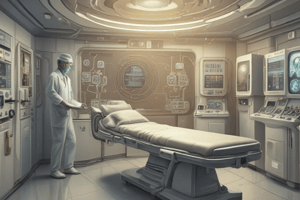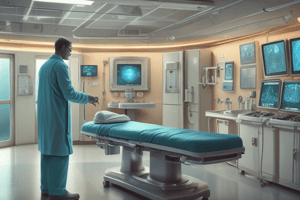Podcast
Questions and Answers
Nuclear Medicine is a medical specialty that uses small amounts of ______ materials, called radiopharmaceuticals, to diagnose and treat diseases.
Nuclear Medicine is a medical specialty that uses small amounts of ______ materials, called radiopharmaceuticals, to diagnose and treat diseases.
radioactive
Radiopharmaceuticals are a group of medicinal formulations that contain ______ isotopes and are used in the field of nuclear medicine.
Radiopharmaceuticals are a group of medicinal formulations that contain ______ isotopes and are used in the field of nuclear medicine.
radioactive
The key component that emits radiation, which can be detected or used for therapeutic effects, is called a ______.
The key component that emits radiation, which can be detected or used for therapeutic effects, is called a ______.
Radionuclide
Nuclear medicine provides information about the function of organs and ______.
Nuclear medicine provides information about the function of organs and ______.
This is a biologically active molecule or ______ that is used in radiopharmaceuticals.
This is a biologically active molecule or ______ that is used in radiopharmaceuticals.
The carrier molecule that delivers the radioactive isotope to specific organs, tissues, or cells within the body is called a ______.
The carrier molecule that delivers the radioactive isotope to specific organs, tissues, or cells within the body is called a ______.
Radiopharmaceuticals are used for ______ purposes, which can be diagnostic, therapeutic, or theranostic.
Radiopharmaceuticals are used for ______ purposes, which can be diagnostic, therapeutic, or theranostic.
The ______ imaging technique fuses the image of both modalities, such as PET/CT or SPECT/CT.
The ______ imaging technique fuses the image of both modalities, such as PET/CT or SPECT/CT.
In Nuclear Medicine, the computation of dosage is based on the ______ and age of the patient.
In Nuclear Medicine, the computation of dosage is based on the ______ and age of the patient.
The first principle of radiation protection in Nuclear Medicine is to ensure ______, followed by distance and then time.
The first principle of radiation protection in Nuclear Medicine is to ensure ______, followed by distance and then time.
Flashcards are hidden until you start studying
Study Notes
What is Nuclear Medicine
- A medical specialty that uses small amounts of radioactive materials to diagnose and treat diseases.
- Provides information about the function of organs and tissues, unlike other imaging techniques that capture images of the body's structure.
Radiopharmaceuticals
- Medicinal formulations that contain radioactive isotopes, used in nuclear medicine.
- Key component: Radioactive Isotopes (Radionuclide), which emit radiation that can be detected or used for therapeutic effects.
- Carrier Molecule: A biologically active molecule or chemical that delivers the radioactive isotope to specific organs, tissues, or cells within the body.
Purpose of Radiopharmaceuticals
- Diagnostic: To diagnose diseases.
- Therapeutic: To treat diseases.
- Theranostic: A combination of diagnostic and therapeutic purposes.
Imaging Techniques
- SPECT (Single Photon Emission Computed Tomography)
- PET (Positron Emission Tomography)
- Hybrid: Fuses the image of both modalities, e.g., PET/CT, SPECT/CT, PET/MRI
Nuclear Physics
- A branch of physics that studies the atomic nucleus and its interactions.
- Explores the fundamental properties of nuclei, including their structure, behavior, and the forces that govern their interactions.
Types of Radiation
- Alpha Particles
- Beta Particles
- Gamma Rays
Decay Processes
- Radioactive decay: Alpha, beta, and gamma decay.
- Half-life concept: The time required for half of the radioactive atoms in a sample to decay.
Nuclear Reactions
- Transformations of atomic nuclei that involve changes in their composition.
- Types:
- Fission: Atomic nucleus splits into several parts, creating energy (e.g., nuclear reactors).
- Fusion: Two light atomic nuclei combine, creating nuclear energy (e.g., stars).
- Radioactive decay: Unstable atom undergoes radioactivity to become stable.
Radiation Safety
- Principles of radiation protection: Time, Distance, Shielding.
- Monitoring and controlling exposure to radiation.
- Regulatory bodies:
- IAEA (International Atomic Energy Agency)
- NRC (Nuclear Regulatory Commission)
- PNRI (Philippine Nuclear Research Institute)
- CDRRHR (Center for Device Regulation, Radiation Health, and Research)
Best Practices and Waste Management
- Proper handling and disposal of radioactive materials.
- Training for healthcare professionals.
Studying That Suits You
Use AI to generate personalized quizzes and flashcards to suit your learning preferences.




